Selby and Ainsty by-election: Voters along A64 have their say on ballot
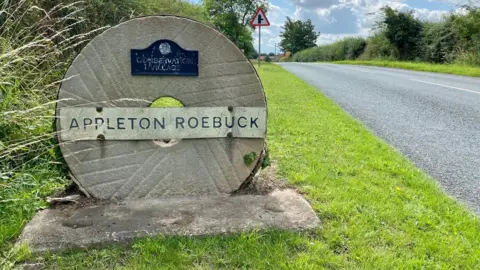 BBC
BBCA collection of leafy villages and market towns is not where electoral change would generally be expected to foment. But when BBC News spoke to residents in the Selby and Ainsty constituency, a common thread offered a hint at the quiet revolt which could affect ballot boxes later this week.
The busy A64 cuts clean through the North Yorkshire constituency.
Whether it's heading east to the seaside delights of Scarborough or making tracks back west to Leeds, the bustling road is a key route, shuttling traffic across this stretch of Yorkshire.
But, when drivers pull away from the dual carriageway a world characterised by well-kept gardens, single road villages and seemingly quiet comfort awaits.
I leave the A64 at the turn off for Bilbrough Services. The heaving traffic is replaced quickly by a quiet country lane as I head for villages like Colton, Appleton Roebuck and Bolton Percy.
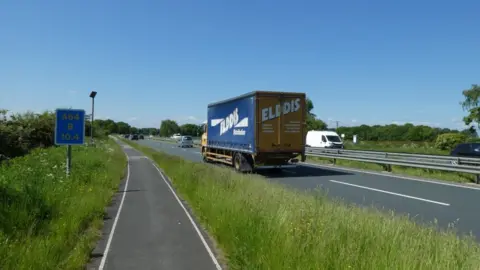 DS Pugh/Geograph
DS Pugh/GeographOn Main Street in Appleton Roebuck, a woman is leaving her house to walk her dog in the morning sun.
She tells me that traffic through the village, sometimes at speed, has become an issue for residents.
Parking outside the school is also a problem, she says, as she looks up and down at a line of cars.
"I have always voted, but at this stage I don't know if I will.
"I have been disappointed, like a lot of people," the woman, who does not want to be named, tells me.
She says she wants politicians to "carry through what they have promised".
That threat to withhold their vote is the key message I hear during my time in the constituency. Issues which may seem parochial or even prosaic to some city dwellers are important factors to voters in these parts.
Along with leaflets from all the main parties, residents in the village say they have also received a letter from Prime Minister Rishi Sunak "outlining his values".
The Richmond MP's seat is close to Selby and Ainsty - separated by only one junction of the nearby A1(M).
Data from the Office of National Statistics (ONS) shows there is a higher proportion of residents aged between 50 and 80 than average in the constituency.
The overall deprivation rate is also below average, with 55.2% of households not deprived in any way compared to 48.4% nationally.
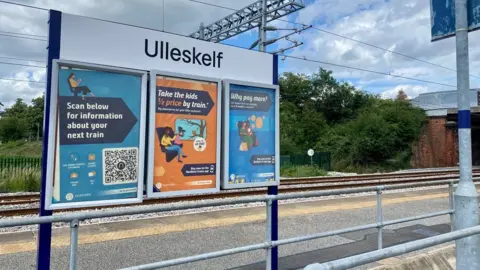 Alamy
AlamyBack on the road, the A64 takes us over the River Wharfe before my next turn off towards the village of Ulleskelf.
The road crosses over the electrified lines which run through the village's railway station, which is served by Northern Rail.
Mick, who runs the local post office and shop on Main Street, tells me train services are an important issue for voters here
He tells me how the journey from York to Ulleskelf, which should take around 10 minutes, once took him four-and-a-half hours as a result of cancellations.
"The main issue used to be HS2. But it's not coming through now," the 69-year-old says from behind the counter.
The number of new homes being built in the village is also a concern for residents, he says, explaining that two new housing developments were built within a year of one another and that more are planned.
A higher proportion of people living in Selby and Ainsty own their own homes than the national average. Here nearly 38% of people own their house outright with a further 37% still paying off their mortgage.
The area's reliance on social housing and rentals is well below the norm seen across the rest of the UK.
'Jump through hoops'
Mick, who has run the shop for 30 years and says he always votes, does not intend to cast his ballot next week though.
The reason? Voter ID.
He doesn't have a passport and has only a paper driving licence.
"I'm not going to jump through hoops just to vote in a by-election," he says.
 Aaron Chown/PA
Aaron Chown/PAThe Selby and Ainsty seat has been held by the Conservatives since it was created in 2010.
Nigel Adams MP, who stepped down at short notice recently, had won with a hefty 20,000 majority in 2019's general election.
Even without his vote Mick believes there could be a shock result "because it's a by-election".
But he's more circumspect on the impact of any change.
"It won't mean a lot".
Back in the car and back on the A64 and I head back eastwards, taking a sharp turn off towards the village of Healaugh.
It's a pretty one-road village, lined with solid brick cottages fronted by gardens boasting hollyhocks and apple trees.
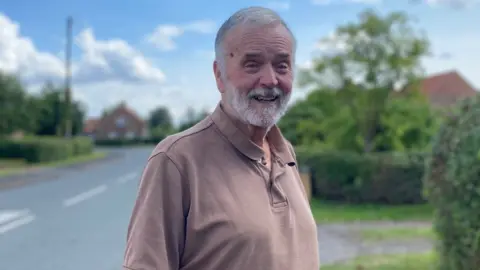
Alan Ibbotson, from Tadcaster, is walking his border terrier Nancy along the street to visit his friend and collect some eggs.
He tells me many of the houses in the village are owned by Samuel Smith's Brewery, which is based in nearby Tadcaster.
Asked about the issues facing the area ahead of the by-election, he says he is unhappy about recent strikes in health services and transport.
"Nobody likes strikes and everybody wants more money," he says.
"Everybody's blaming this government unfairly."
What does he think he will do come Thursday when the polling stations open?
"I've always voted but I'm not sure if I will this time."
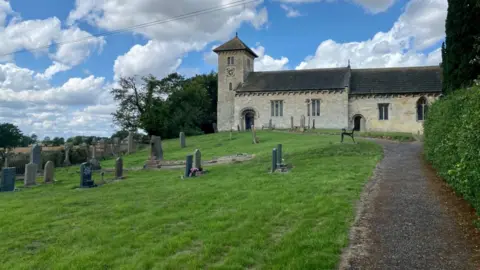
My final stop is the village of Bilbrough, on the eastern edge of the constituency and around half a mile from the A64.
Suzi is cutting the grass at the front of her house and stops to chat in the sunshine.
She does not intend to vote, and says she has not done so since the 1980s.
"I can't think of any politician that I would be proud to say I had voted in," she says.
She tells me she feels the need for politicians to remain popular and the "spin" the media puts on issues means MPs have to "water down" their views.
"I think that's a problem for democracy. I'm not sure the system is one I want to be part of."
Trust in politicians is the worry residents have raised repeatedly when I have stopped along the A64.
Put simply, they told me that lack of trust could mean the lack of a vote.
In a constituency which is more likely to vote than the national average, that withering away of voting habits could have big implications for all parties.

Follow BBC Yorkshire on Facebook, Twitter and Instagram. Send your story ideas to [email protected].
